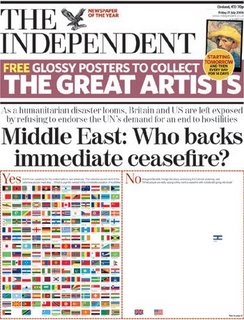Tuesday, July 25, 2006
Lebanese newspapers in Arabic
Buddies
- Baro
- Bigio
- Ciccio
- Ðuzo
- G.
- Giovanni
- Majaro
- Marti
- Massimo
- Max
- Michael
- Oriana
- Peppe
- Sami
- Vanity Hair
- Vikingur

Member of Lebanon's Blogs, a Lebanese blog aggregator.
Rufus likes strawberries
| adopt your own virtual pet! |
Archives
- January 2006
- February 2006
- March 2006
- April 2006
- May 2006
- June 2006
- July 2006
- August 2006
- September 2006
- October 2006
- November 2006
- December 2006
- January 2007
- February 2007
- March 2007
- April 2007
- May 2007
- June 2007
- July 2007
- August 2007
- September 2007
- October 2007
- November 2007
- December 2007
- January 2008
- February 2008
- May 2008
- December 2008











1 Comments:
Thanks for leaving your comment and please excuse my late reply.
1. You are right: any comparison between IRA and Hezbollah is stretched. So is any comparison between Hezbollah and the Third Reich, or between the current Israeli military operations in Lebanon and WWII. I am happy that you agree with me in this regard. As you correctly point out, it is not possible to draw a parallel between movements and conflicts that originate from different backgrounds and operate (or take place) in different areas. That's why it is preposterous to bundle together phenomena as different as Hamas, Hezbollah, the Taliban, al-Qa'idah, Darfur, Ahmadinejad and the battle of Khaybar as if they were "the same thing". That's why it is preposterous to extrapolate facts and situations out of their proper historical and geographical context (for example, using events that happened near Makkah in the 7th century to make a point about Lebanon in 2006).
2. You probably failed to see my point about IRA. The point is that (despite the very specific conditions that make each case unique) here you have an example of a Western government that has to address a substantial security threat posed by a terrorist group (or a group labelled as such) which is resorting to violent actions against civilian targets (such as placing explosive devices in underground stations). That government resorts to a
a mix of cohercion, use of military might and negotiation, and actually ends up directly negotiating the disarmament of the militant group with its political wing (some of whose members are even elected as MPs). A similar pattern of law enforcement operations combined with more or less underground negotiations can be observed in Euskadi/Basque Country between the Spanish government and ETA-Batasuna.
Did anyone advocate forms of collective punishment for the areas where those groups had their strongholds? Did anyone endorse to shell civilians while going after those enemies? Other than Francisco Franco in Gernika, I mean.
3. I believe that you need a clarification on the concept of "proportionate response", which is not, as your anonymous guest incorrectly suggested, a finely tuned scheme of action and reaction where someone responds to an offence with precisely the same gesture. The idea of "proportionality" is actually about a reasonable balance between ends and means: the means must be "proportional" and consistent with the ends that you want (or pretend) to achieve.
If you have a stomachache, you take an antacid. You don't start a chemotherapy, do you? The cure must be proportionate to the illness and address it with the minimum level of collateral effects, otherwise it is only making matters worse. Do you get the point?
4. The disingenuous Israeli propaganda on the use of "human shields" by Hezbollah is really disturbing. In fact, a research study carried out by Human Rights Watch has concluded that in all the 24 cases they document there was "no evidence that Hizbullah was operating in or near the areas that were attacked by the Israeli air force". You can read more on this in: "Israel, not Hizbullah, is putting civilians in danger on both sides of the border" by Jonathan Cook.
5. I have been in Southern Lebanon several times and I can tell you that the UN bases are very clearly marked, sometimes in isolated locations. It is extremely unlikely that one could target them by mistake. I also wonder what real "tactical necessity" stands for here. I fail to see your point about the Mount Dov kidnapping story: it is not a matter of who has to express more profound apologies and acts of contrition for past and current mistakes, but whether it makes any sense to "accidentally" target an international truce supervision contingent. You forgot to mention that UNIFIL observers have a strict mandate and cannot come and go as they please. Should the UN have decided to withdraw their UNIFIL troops from southern Lebanon, after the parts had agreed on their deployment as a buffer force? I disagree. I assess positively the deployment of UNIFIL as of September 2006.
6. I appreciate your concern about the death of Lebanese civilians and I would appreciate if you believed that I am also concerned about the death of Israeli civilians in Galilee. My point is that the whole operation has been wrong and counterproductive for Israel, as well as the action of Hezbollah has been wrong or counterproductive for Lebanon.
You ask: what else can one do in a similar situation? I ask: why and how can't one stop to do something that is wrong and counterproductive?
Post a Comment
<< Home